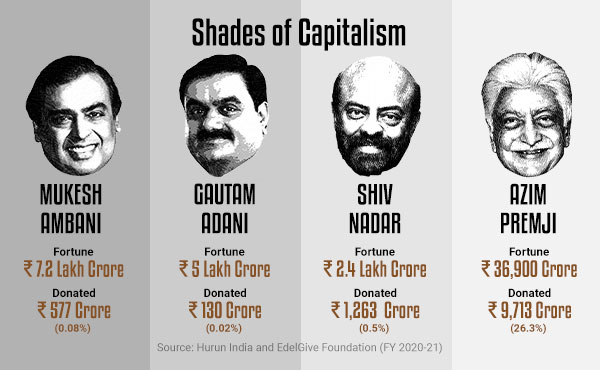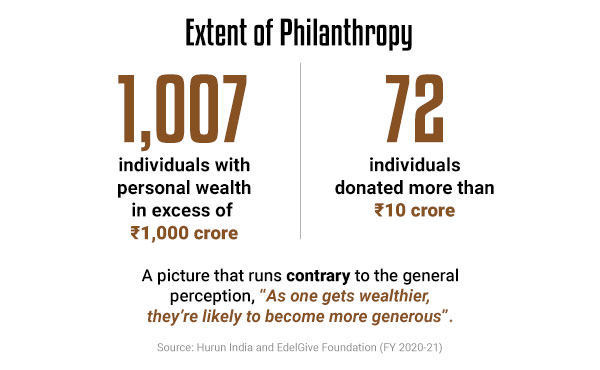
India is now a host to 142 billionaires, more than France, Sweden and Switzerland combined. The total wealth of these billionaires is worth more than the poorest 55 crore Indians. It is well-understood that such scales of professional success cannot be reached without having the mindset of a capitalist. But there is a specific DNA that separates one capitalist from the other, one that shapes their outlook towards life outside their business - the DNA of giving.

Mukesh Ambani, 64, is the chairman and the largest shareholder of Reliance Industries Ltd., a textile company founded by his father in 1973. Mukesh's efforts in steering Reliance towards telecommunications and organized retail saw the company stock and his personal wealth rise over the years, making him the richest man in India and the fourth richest in Asia. His personal fortune (as of Mar '21) was ₹7.2 lakh crore of which he donated only ₹577 crore (0.08% of his total net worth). Unlike his global peers, he has not yet made any pledge to distribute his immense wealth.
Gautam Adani, 59, is the founder and chairman of Adani Group, a diversified group of companies with interests in port management, renewable energy, mining, airport operations, and infrastructure. His rise from being a simple commodity trader in 1988 to becoming one of India's richest individuals is the subject of many management and political case studies. His personal fortune (as of Mar '21) was ₹5 lakh crore of which he donated ₹130 crore (0.02% of his total net worth). Unlike his global peers, he has not yet made any pledge to distribute his immense wealth.
Shiv Nadar, 76, is the founder and chairman emeritus of HCL Technologies Ltd., a listed IT enterprise major. He is also the founder of the Shiv Nadar Foundation which backs education-related causes. His personal fortune (as of Mar '21) was ₹2.4 lakh crore of which he donated ₹1,263 crore (0.5% of his total net worth). He has committed to donating ₹7,500 crore of his personal wealth to his Foundation.
Azim Premji, 76, is the founder and ex-chairman of Wipro Ltd., the 29th largest Indian company by total revenue. His personal fortune (as of Mar '21) was ₹36,900 crore of which he donated ₹9,713 crore (26.3% of his total net worth). In the previous year too, he donated ₹7,904 crore, the highest by an individual in India. He has committed to donating over half of his wealth during his lifetime.
| Also read: Data on philanthropy in India - policy framework, NGOs, CSR, and individual donations. |

As of Mar'21, India had 1,007 individuals who owned assets worth more than ₹1,000 crore. However, only 72 of them donated more than ₹10 crore while the majority continued to hold onto their immense wealth. The hoarding of wealth by such individuals has contributed to the growing wealth divide in India where the richest 142 billionaires own as much as the poorest 55 crore Indians.
Realizing the implications of inequitable distribution of wealth on education, healthcare, and crime, 190 of the wealthiest individuals and families around the world have signed The Giving Pledge, a promise to dedicate the majority of their wealth to charitable causes. Despite being richer than many others on the list, only 5 Indians are signatories to the Pledge. While some carry out charitable activities through their own foundations, the figures clearly show that it is just not enough. It is estimated that a daily wage worker in India will take 941 years to live the lifestyle currently lived by a rich CEO. And the gap is only getting wider with each passing year.
The proper aim of giving is to put the recipients in a state where they no longer require our gifts - C.S. Lewis
The world is facing its extremest levels of inequality that have only been further exacerbated by the Covid-19 pandemic. It is estimated that families who have fallen into poverty during the pandemic (over 4.5 crore in India alone) will take over 10 years to regain their position. Such societal challenges cannot be overcome by the government alone. It requires the collaboration of governments, NGOs, and most importantly the wealthy individuals who can fund research, healthcare and mass education programs that the government does not have sufficient funds for. It has become almost fashionable of late to be called a philanthropist in India and most businessmen and celebrities proudly flaunt the badge. They aspire for a reputation for generosity, but the irony is that they want to buy it cheap!
TO READ THE FULL ARTICLE

Get full access to the exciting content on The Mirrority by logging in
Support independent journalism
Even the very best of media houses in our country today are yielding to the pressure of click-bait journalism in order to survive. More than ever before, our country needs journalism that is independent, fair and non-pliant to the bureaucracy. Such journalism needs the support of like-minded readers like you to help us survive editorially and financially.
Whether you live in India or India lives inside you, help us continue to produce quality journalism with your contribution.
CONTRIBUTE
